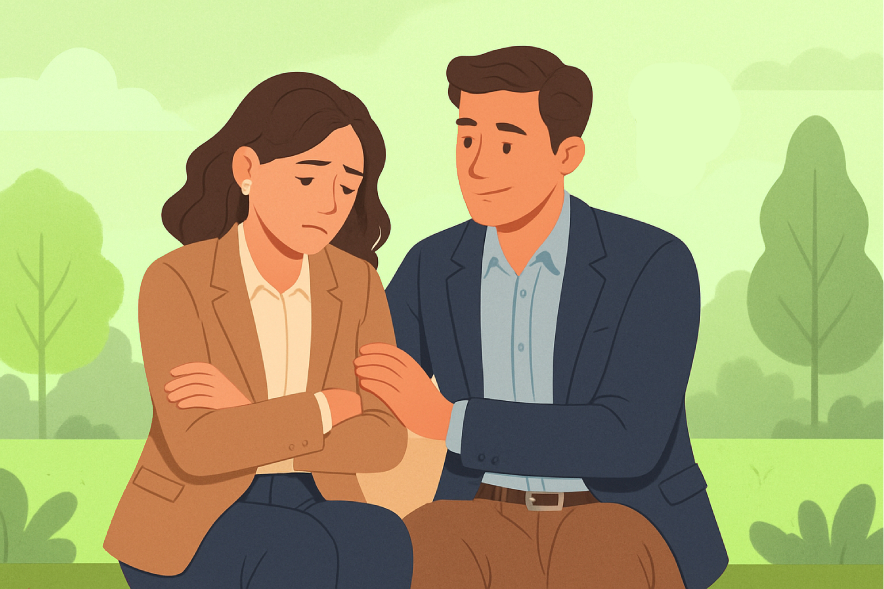Yep, we’re talking about emotional dependency. The clingy cousin of actual love. And figuring out whether you're in love or just emotionally attached is trickier than people admit. But it’s important. Because one helps you grow, and the other makes you shrink.
Love gives. Dependency needs.
Here’s one way to think about it: Love is like breathing fresh air. Emotional dependency is like gasping for oxygen in a crowded room.
When you really love someone, you're happy when they’re happy. You want the best for them, even when it doesn’t directly benefit you. It feels warm, steady, and weirdly peaceful, even in tough times. It’s not always fireworks — sometimes it’s just quietly eating takeout on the couch and still feeling connected.
But when it’s emotional dependency? You might feel like you can’t function without them. You might constantly fear they’ll leave. And you could be ignoring red flags just so you don’t end up alone.
That doesn’t mean you’re broken or needy. It just means some wires got crossed. And now your nervous system thinks your partner is a human anxiety pill. Which, newsflash, they are not.
How you spend time apart says a lot
One of the biggest red flags that you’re in a dependent relationship? How you feel when they’re not around.
If you feel good and grounded when you're on your own — that’s a green flag. If you miss them but you're not spiraling, that’s normal. But if you feel anxious, restless, or like you can’t enjoy anything without their presence, that might be something to look at.
Love says, “Go hang with your friends, I’ll be here.” Dependency says, “Why didn’t you text me back in 23 minutes?” See the difference?
A 2017 study in the Journal of Social and Personal Relationships found that people with high emotional dependency often confuse intensity with intimacy. So if you're confusing a rollercoaster of highs and lows for true closeness, you're definitely not alone. But that ride gets exhausting fast.
Let’s talk jealousy — the fun killer
In real love, there's trust. In emotional dependency, jealousy shows up like an uninvited guest who eats all your snacks.
Love gives your partner room to breathe. Dependency checks their phone when they’re in the shower. (And then regrets it, but does it again next week.)
Look, a little jealousy is normal. We’re human. But if it’s constant — if you need reassurance every day, or you panic when they mention a coworker’s name — that’s your insecurity doing the talking, not love.
The fix isn’t to control your partner. It’s to figure out where that fear is coming from. Therapy helps. So does journaling. Or chocolate. Chocolate is also valid self-care.
You shouldn’t lose yourself
One big sign you’re leaning toward dependency? You forget who you were before the relationship.
Maybe you stop seeing your friends. You give up your hobbies. You start dressing the way they like. And before you know it, your Spotify playlists are full of music you don’t even like, but they do.
That’s not love. That’s disappearing.
In healthy relationships, you stay yourself — you just have someone cheering you on while you do it. You still read weird fantasy novels or go on your solo hikes or wear the ugly sweatshirt they hate (because you love that ugly sweatshirt and that’s your right).
Love supports who you are. Dependency tries to turn you into someone else’s idea of ideal.
How conflict plays out tells you everything
When you fight, does it feel like the end of the world?
In a solid relationship, arguments suck, but you both try to understand each other. It might take a while, but you find your way back.
In a dependent relationship, conflict feels catastrophic. Like, "if we disagree, you might leave me and I’ll fall apart." So you avoid hard conversations. You say you're fine when you’re not. You apologize just to keep the peace, even when you're not wrong.
That’s not love. That’s survival mode.
Your partner should be a part of your life — not your entire emotional ecosystem
This might be the hardest truth: If your partner feels like your whole world, that’s a problem. You need other worlds. Your friends. Your job. Your family. Your weird hobbies. Your weekend solo Target runs. (Don't act like you don’t do that.)
Relying on one person for all your emotional support puts too much pressure on the relationship. And eventually, it breaks.
Love says, “You matter to me and I love sharing my life with you.” Dependency says, “If you go, I don’t know who I am.”
So what now?
If you’re reading this and thinking, “Oof… this sounds familiar,” don’t panic. Most of us have felt this way at some point. Especially if you grew up being told your feelings were too much or you’ve had partners who made you feel like love is something you have to earn.You don’t have to be perfect to be loved. But it helps to be honest with yourself about what you really feel — and why.
Start by checking in with yourself more. Notice what you want vs. what you’re afraid of. Keep the parts of your life that are yours. And remember: real love should make you feel safe, not small.
Because at the end of the day, love shouldn’t feel like a tightrope walk. It should feel like a place to land.
